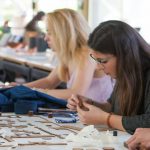On her own in Vietnam, MARY ELLEN HITT attempts to forge a new academic program, despite hungover profs, textbooks she can’t read, and the allure of backpackers in linen pants.
After sliding off the back of a motorbike taxi, I hauled myself up three flights of stairs to find that, yet again, I’d been stood up. Mr. Nhut, the school secretary, delivered the news smiling: “Your teacher, he drink too much last night and don’t meet with you today.” He smiled again and went back to work. I went home for an early lunch, dying to share the story with the other students – oh, wait: There weren’t any.
This was not exactly what I’d expected when the dean of my school, Simon’s Rock College of Bard, approached me to participate in a new study abroad program in Vietnam. I knew I’d be a pioneer, the only foreign student at the Ho Chi Minh City Open University, where I’d take 13 credits-worth of classes in Vietnamese history, culture, tourism, and language, in addition to an independent study through Simon’s Rock. Beyond this, I knew nothing. I’d been abroad before – to Myanmar, with the dean – and had been surprised at my independence, comfort, and curiosity in a place that was so foreign. What I expected before going to Vietnam was that my program would be basic in its infancy, but would provide me with a solid introduction to Vietnamese culture through classes and the university community. Like any optimistic person facing the unknown, I was excited.
“I Never See This Bird Before”
The revision of my expectations began as soon as I stepped off the plane. Mr. Nhut, a small man of 29 (but who looked 17), met me at the airport and delivered me to the house of Le Hoang Lam, a wealthy 42-year-old businessman and bachelor who happened to be the brother of the Open University’s president. Lam lived with Sau, his unmarried sister, and Van, their young, distant relative from the countryside. Lam was the only person in the house who spoke any English, and his knowledge was very selective. He could talk easily about dogs, Andre Agassi, or the time he studied business in Sweden. One exciting day, he brought home a baby eagle. “I never see this bird before,” he said, “so I buy it.”
As a guest in the Lam household, I received what felt like unusual treatment. For example, I never ate meals with my host family. I would come down to the kitchen at mealtimes to find food—at first, a thick loaf of the most artificial white bread I’d ever eaten, along with three jars of jam. I told the family I wanted to eat Vietnamese food, but Lam insisted that they would get me potatoes soon. Eventually, they served me a regular diet of pan-fried tofu, rice, green beans, and some kind of soup. The food was either left out for me or served to me by Van, who did all the cooking and cleaning. (I once asked Van how old she was. “Sixteen or 17,” she said. “I don’t know.”) Sau, meanwhile, spent her days watching Korean soap operas and Vietnam’s parody of Who Wants to Be a Millionaire? (The show’s top prize was around $6,000.) Over six months, our dynamic changed little, even as I began to learn Vietnamese, and I was essentially left alone until I needed more toilet paper, which was mysteriously kept in bulk in Sau’s bedroom.
The Open University, too, upended my expectations. What I had hoped might be a Saigonese Ivy turned out to be a kind of community college spread over two city blocks. The buildings were typical Vietnamese construction: three stories or so of dirty white concrete, with exposed walkways passing by rattling air-conditioners. My classes took place in a large room with desks for 60 students; my teachers and I would push two of the desks together and sit facing each other, talking. The professors – Dr. Thanh, a slight, sweet woman who designed the curriculum; Dr. Dung, who had studied at Harvard; Dr. Muoi, an accomplished former tour guide – would lecture for two hours and write notes on a whiteboard. I would take notes, occasionally asking questions like “Do most Vietnamese recognize the connection between JFK and the assassination of Ngo Dinh Diem?” or “I’m going traveling for a few weeks, where should I buy my train tickets?” My course materials, which I began to receive two months into the program, consisted mostly of pamphlets with titles like Hanoi Temples and Vietnamese Culinary Art, which seemed more for tourists than for students. Once, a real book seemed to be on its way, but when it arrived, it was entirely in Vietnamese.
Amazingly, serious works did show up. In history class, I read a photocopy of Joseph Buttinger’s Vietnam: A Political History, which Dr. Dung regarded as the most accurate text about Vietnamese politics but which is banned in Vietnam because of its criticism of communism. (Example: “By 1930, a great many peasants were ready to listen to any party whose leaders were willing to make the plight of the poor their chief concern. This fact, unfortunately, was grasped only by the Communists.”) Dr. Dung also gave me a genuine copy of Nguyen Khac Vien’s Vietnam: A Long History, which he described as the exact opposite of Buttinger’s work, adding that we could use it to see how they differed on similar issues. (We never read it.)
Where the Streets Have Known Names
It was in Dr. Dung’s class – appropriately enough – that I began to really understand where I was living. Every lecture illuminated the origins of street and place names in Ho Chi Minh City, which are invariably named after revolutionaries and heroes. Navigating the streets was both homework and acclimation. Written assignments were minimal and infrequent, and the professors were always a little surprised when I actually turned them in. They were pleased with me, but beyond that they trusted me, gradually revealing their personal experiences and, surprisingly, their political views. Dr. Dung’s father was a big communist leader during the war, and Dr. Dung himself worked for Vietnam’s equivalent of the CIA for five years after college. He hated it, but got a power trip out of arresting anyone he wanted, simply because they looked suspicious. I told Dr. Thanh of my frustration with getting taunted by motorbike taxis; she told me that motorbike taxis taunt her the same way – even though they’ve known her for years.
Despite these fascinating and surprisingly emotional exchanges, still I was put off by the fact that I never received a calendar of the semester (or even a list of breaks or holidays) or any syllabi for my courses. I was expected to adjust to my frequent class cancellations, and I eventually stopped asking for even the roughest of program schedules because those, too, would likely change.
One thing never changed, though: There were few people to share this experience with. No one ever formally introduced me to any of the 15,000 Vietnamese students at the Open University (so much for openness). Once, a student overcame her shyness to approach me – in the bathroom, a tight space with three stalls, squat toilets, and neither TP nor soap – and ask if I would teach her English. She was kind and curious, but insisted that I give her my phone number and asked me when I was free to “make friends.” I felt a sudden obligation to her and felt guilty that my eagerness to teach withered in front of her eagerness to learn. (So much for my openness.) Most interactions I had with students were based on the premise that I was an English teacher, not a fellow student.
With no other students in my program, reflecting and processing my experience was a silent, solitary act. All the foreigners seemed to be transient backpackers, coolly on their way to the next exotic paradise. Fortunately, though, an American friend of Dr. Thanh introduced me around, to graphic designers, radical artists, filmmakers, and journalists, all of whom included me in their lives even though I was only an 18-year-old student. Somehow, I never met a single study abroad student while I was in Vietnam, and by the time I left the country, six months later, I didn’t care.
Because once I started treating my experience as a move to Ho Chi Minh City, rather than a mere study abroad program, my struggles became reasonable. I expected less from the program and more from myself. I rented a motorbike – against the advice of everyone who had never been to Vietnam – and learned how it feels to drive home at 1 a.m., when the city is nearly empty and the orange glow of the streetlights illuminates both the road and the fearless traffic of cockroaches. My friends had homes, not housing; they had lives, not tenancies. I was a lone student surrounded by curious locals and cosmopolitan expats, and learned to live as they did.
At the same time, I don’t want future Simon’s Rock Open University students to go through what I had to. For my senior thesis, I’m now creating a real study abroad program that includes: a pre-trip orientation; an itinerary for the semester; at least two students per host family; written syllabi for every class; and weekly meetings between students and program organizers. The real difficulty, however, is that I am designing a program based on a semester I didn’t have. I learned to live in a foreign country and I want future students to learn the same, but with a supportive, organized academic community. Ultimately, I want students to learn how to live in an initially foreign and abrasive place and realize their ability to be global citizens. Just not alone.
HOW TO SURVIVE A SEMESTER ABROAD AND ALONE
TELL your friends, teachers, co-workers, and acquaintances where you’re going. Chances are, they’ll know someone there who can offer invaluable advice.
BUY a student bus pass and take public transportation. It’s a local experience, the card is a nice souvenir, and you won’t have to bargain your way to class.
BUY a cell phone. It’s convenient, will help keep you in touch, and your host family won’t have to field your messages.
TAKE your professor out to lunch and have class in a cafe.
AFTER the first month, leave the country and take a short trip somewhere in the region. You’ll miss your new home – instead of your old one.



